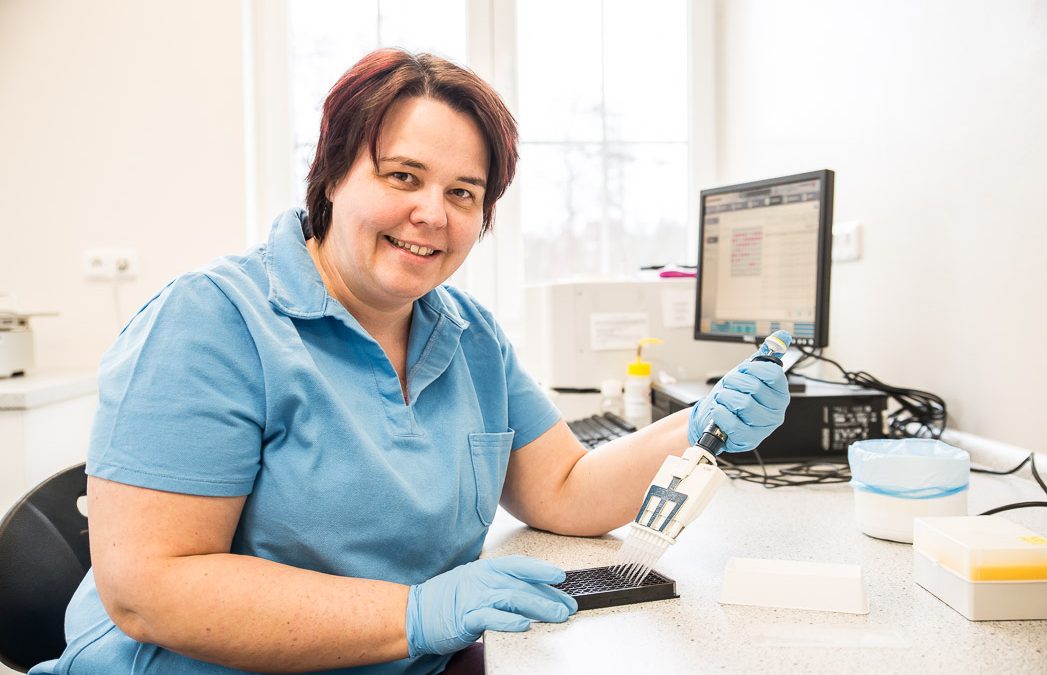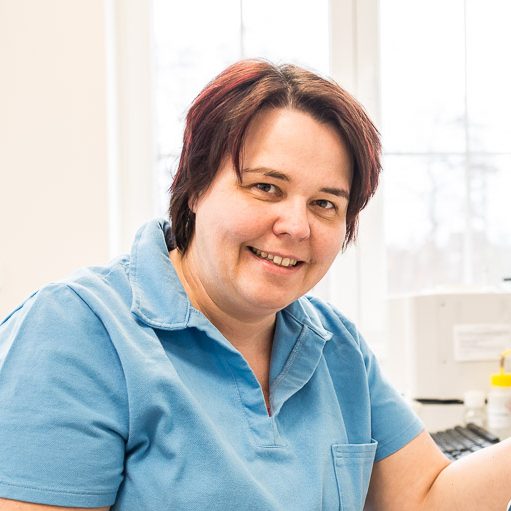Laboratory of proteomics
Head: Helena Kupcová Skalníková
Prague node
HOME INSTITUTION
First Faculty of Medicine CU
RESEARCH PROGRAMME(S)
RP 1 - Molecular basis of cancer and molecular targets
Can we listen to a crosstalk between cells?
- Mission: To search for proteins regulating tumor development.
- Vision: Contribute to understanding of molecular processes in tumor growth relevant for cancer diagnosis and therapy.
Proteins represent key functional molecules in living organisms. Proteins determine the structure and function of cells, drive metabolic pathways, and participate in signal transduction and regulation of cellular processes. Laboratory of Proteomics studies roles of selected proteins in tumor growth, particularly in proliferation and differentiation of cells. Beside the cellular proteins, we also characterize mechanisms that the cells use for the inter-cellular communication to modify the tumor microenvironment. Proteins released by cells to the extracellular milieu, such as growth factor and cytokines, as well as extracellular vesicles (e.g., exosomes) may carry signals for cell survival and proliferation and they may also participate in regulation of immune response to the tumor. We closely co-operate with Institute of Animal Physiology and Genetics of the Czech Academy of Sciences, where we on a pig model study molecular mechanisms in spontaneous regression of melanoma. Results of our basic research may lead to identification of potential biomarkers for detection of disease development or monitoring the therapeutic response.
SELECTED PUBLICATIONS
- Ananbeh H, Novak J, Juhas S, Juhasova J, Klempir J, Doleckova K, Rysankova I, Turnovcova K, Hanus J, Hansikova H, Vodicka P, Kupcova Skalnikova H. Huntingtin Co-Isolates with Small Extracellular Vesicles from Blood Plasma of TgHD and KI-HD Pig Models of Huntington’s Disease and Human Blood Plasma. Int J Mol Sci. 2022 May 17;23(10):5598. DOI: 10.3390/ijms23105598
- Červenka J, Tylečková J, Kupcová Skalníková H, Vodičková Kepková K, Poliakh I, Valeková I, Pfeiferová L, Kolář M, Vaškovičová M, Pánková T, Vodička P. Proteomic Characterization of Human Neural Stem Cells and Their Secretome During in vitro Differentiation. Front Cell Neurosci. 2021 Jan 28;14:612560. DOI: 10.3389/fncel.2020.612560
- Horak V, Palanova A, Cizkova J, Miltrova V, Vodicka P, Kupcova Skalnikova H. Melanoma-Bearing Libechov Minipig (MeLiM): The Unique Swine Model of Hereditary Metastatic Melanoma. Genes (Basel). 2019 Nov 9;10(11). pii: E915. DOI: 10.3390/genes10110915
- Bravo-Hernandez M, Tadokoro T, Navarro MR, Platoshyn O, Kobayashi Y, Marsala S, Miyanohara A, Juhas S, Juhasova J, Skalnikova H, Tomori Z, Vanicky I, Studenovska H, Proks V, Chen P, Govea-Perez N, Ditsworth D, Ciacci JD, Gao S, Zhu W, Ahrens ET, Driscoll SP, Glenn TD, McAlonis-Downes M, Da Cruz S, Pfaff SL, Kaspar BK, Cleveland DW, Marsala M. Spinal subpial delivery of AAV9 enables widespread gene silencing and blocks motoneuron degeneration in ALS. Nat Med. 2020 Jan;26(1):118-130. DOI: 10.1038/s41591-019-0674-1
- Kupcova Skalnikova H. Proteomic techniques for characterisation of mesenchymal stem cell secretome. Biochimie. 2013 Dec;95(12):2196-211. DOI: 10.1016/j.biochi.2013.07.015
COLLABORATION WITHIN THE NICR
SPECIALIZED EXPERTISE AND TECHNOLOGY
Advanced techniques of protein/peptide separation, identification and quantification using nanoHPLC and mass spectrometry with ion mobility separation
Multiplex immunoassays of growth factors, cytokines, chemokines and other molecules
Isolation and characterization of extracellular vesicles
Cell culture, neural stem cell differentiation, immunocytochemistry, confocal microscopy, functional in vitro assays
Detection of tumor infiltrating immune cells, immunohistochemistry
Pig models of human diseases (melanoma, Huntington´s disease)



